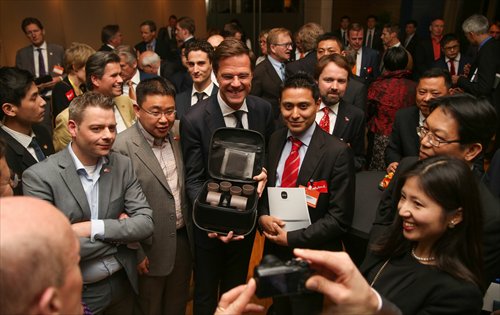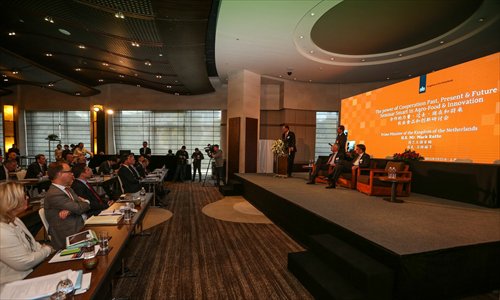HOME >> METRO SHANGHAI
The Dutch Delegation
By Ni Dandan Source:Global Times Published: 2015-3-29 18:28:07
Netherlands Prime Minister Mark Rutte, leading a delegation of over 70 Dutch business representatives on a trade mission to China, was in Shanghai last week to participate in the "Power of Cooperation: Past, Present and Future" seminar, where discussions were held about innovation and cooperation in the fields of agriculture and food.
At the seminar, Rutte listened to representatives from Dutch companies in China share their observations on bilateral cooperation in the agri-food sector and their opinions on the challenges of future opportunities.
"Dutch companies lead the way in expertise on agri-food, water management and life sciences, fields that will determine the future of our planet, especially in densely populated regions like Shanghai," he said.
The Prime Minister said that he also learned about many innovative joint ventures in the agri-food sector that are working together to improve the quality, safety and yield of local dairy produce, such as the Sino-Dutch Dairy Development Centre - a partnership between Wageningen University, China Agricultural University, FrieslandCampina CRV and Beijing Zhongdi Breeding Company Limited.
Wilco Hendriks, CEO of Rabobank China and a keynote speaker at the seminar, said that as Chinese consumers are leading more busy, urban lives, they are seeking more convenient meals. As a result, he expects to see growth in China's emerging food sectors, especially in organic and functional foods.
"This ongoing shift creates significant opportunities for businesses to increase their focus downstream - investing in or acquiring brands, upgrading supply chains to deliver high-end food formats, developing tailor-made products and services, and investing in retail food sectors," Hendriks said.
However, Hendriks, whose company specializes in agri-food financing, said that China faces significant challenges in being able to meet the country's forecasted consumption levels. "China has more than 630 million farmers on a shrinking arable land base. The country needs to grow agriculture - at the basic farming level and in the areas of research, education and farm extension services," he said.
Hendriks said that he believes this can be achieved by adopting a similar approach to that taken by the Netherlands in the postwar era - smallholders cooperating in family farms and investing in livestock, and shifting homegrown crops to high value products while importing lower value products.
The goal of Prime Minister Rutte's trade mission to China was to strengthen diplomatic and economic ties between the two countries. The delegation he led to China were primarily from the sectors of agriculture, e-commerce, energy, high technology, and environmental technology.
For his second stop in China, Rutte visited the Shenzhen headquarters of Huawei, a Chinese telecom solutions provider and one of the biggest Chinese enterprises in the Netherlands, and Chinese company DJI Technology, one of the largest manufacturers of drones for use in the agriculture and energy sectors.
Following Shenzhen, the Prime Minister arrived in Hainan to attend the Boao Forum for Asia, an annual conference for government leaders, international researchers and businesses, where he gave a speech at the plenary opening session and held bilateral talks with Chinese President Xi Jinping.
According to Xinhua News Agency, President Xi emphasized during the meeting that to ensure the steady development of Sino-Dutch bilateral relations, the two countries should consolidate and expand cooperation in the fields of agricultural, dairy, pollution treatment and clean energy. The Chinese President said he also hoped to see the Netherlands export more new high-tech products and technologies to China.
After his meeting with President Xi, Rutte announced that the Netherlands would apply to become a founding member of the Asian Infrastructure Investment Bank (AIIB). "There is a great shortage of financing for infrastructure in Asia," he said. "An investment bank such as the AIIB can meet this demand, and the Netherlands has much expertise in this area."
The Netherlands is China's third largest trading partner in the EU. At present, there are more than 1,000 Dutch companies operating in China, while more than 500 Chinese companies have branches in the Netherlands. In 2014, mutual trade between the two countries totaled almost 44 billion euros ($47.90 billion).
Despite social and cultural differences between China and the Netherlands, Prime Minister Rutte believes that the two nations have much in common. "Our spirit of enterprise, our culture of innovation, our pragmatic mind-set and result-based approach. We're always looking for the best solutions to current and future challenges," he said.
At present, approximately 3,000 Netherlands citizens work and live in Shanghai. The city is also home to over 800 businesses that are directly or indirectly based in the Netherlands.
Prime Minister Rutte said that Shanghai, the world's biggest port, plays a special role in the relationship between China and the Netherlands, home to Europe's biggest port in Rotterdam. "Shanghai is an economic hot spot to rival any in the world. This city alone generates no less than one-eighth of China's total income. It's bursting with energy. You feel that as soon as you land here. It's a vibrant city with enviable growth figures and with great potential for international businesses, thanks in part to the Free Trade Zone," Rutte said.


At the seminar, Rutte listened to representatives from Dutch companies in China share their observations on bilateral cooperation in the agri-food sector and their opinions on the challenges of future opportunities.
"Dutch companies lead the way in expertise on agri-food, water management and life sciences, fields that will determine the future of our planet, especially in densely populated regions like Shanghai," he said.
The Prime Minister said that he also learned about many innovative joint ventures in the agri-food sector that are working together to improve the quality, safety and yield of local dairy produce, such as the Sino-Dutch Dairy Development Centre - a partnership between Wageningen University, China Agricultural University, FrieslandCampina CRV and Beijing Zhongdi Breeding Company Limited.
Wilco Hendriks, CEO of Rabobank China and a keynote speaker at the seminar, said that as Chinese consumers are leading more busy, urban lives, they are seeking more convenient meals. As a result, he expects to see growth in China's emerging food sectors, especially in organic and functional foods.
"This ongoing shift creates significant opportunities for businesses to increase their focus downstream - investing in or acquiring brands, upgrading supply chains to deliver high-end food formats, developing tailor-made products and services, and investing in retail food sectors," Hendriks said.
However, Hendriks, whose company specializes in agri-food financing, said that China faces significant challenges in being able to meet the country's forecasted consumption levels. "China has more than 630 million farmers on a shrinking arable land base. The country needs to grow agriculture - at the basic farming level and in the areas of research, education and farm extension services," he said.
Hendriks said that he believes this can be achieved by adopting a similar approach to that taken by the Netherlands in the postwar era - smallholders cooperating in family farms and investing in livestock, and shifting homegrown crops to high value products while importing lower value products.
The goal of Prime Minister Rutte's trade mission to China was to strengthen diplomatic and economic ties between the two countries. The delegation he led to China were primarily from the sectors of agriculture, e-commerce, energy, high technology, and environmental technology.
For his second stop in China, Rutte visited the Shenzhen headquarters of Huawei, a Chinese telecom solutions provider and one of the biggest Chinese enterprises in the Netherlands, and Chinese company DJI Technology, one of the largest manufacturers of drones for use in the agriculture and energy sectors.
Following Shenzhen, the Prime Minister arrived in Hainan to attend the Boao Forum for Asia, an annual conference for government leaders, international researchers and businesses, where he gave a speech at the plenary opening session and held bilateral talks with Chinese President Xi Jinping.
According to Xinhua News Agency, President Xi emphasized during the meeting that to ensure the steady development of Sino-Dutch bilateral relations, the two countries should consolidate and expand cooperation in the fields of agricultural, dairy, pollution treatment and clean energy. The Chinese President said he also hoped to see the Netherlands export more new high-tech products and technologies to China.
After his meeting with President Xi, Rutte announced that the Netherlands would apply to become a founding member of the Asian Infrastructure Investment Bank (AIIB). "There is a great shortage of financing for infrastructure in Asia," he said. "An investment bank such as the AIIB can meet this demand, and the Netherlands has much expertise in this area."
The Netherlands is China's third largest trading partner in the EU. At present, there are more than 1,000 Dutch companies operating in China, while more than 500 Chinese companies have branches in the Netherlands. In 2014, mutual trade between the two countries totaled almost 44 billion euros ($47.90 billion).
Despite social and cultural differences between China and the Netherlands, Prime Minister Rutte believes that the two nations have much in common. "Our spirit of enterprise, our culture of innovation, our pragmatic mind-set and result-based approach. We're always looking for the best solutions to current and future challenges," he said.
At present, approximately 3,000 Netherlands citizens work and live in Shanghai. The city is also home to over 800 businesses that are directly or indirectly based in the Netherlands.
Prime Minister Rutte said that Shanghai, the world's biggest port, plays a special role in the relationship between China and the Netherlands, home to Europe's biggest port in Rotterdam. "Shanghai is an economic hot spot to rival any in the world. This city alone generates no less than one-eighth of China's total income. It's bursting with energy. You feel that as soon as you land here. It's a vibrant city with enviable growth figures and with great potential for international businesses, thanks in part to the Free Trade Zone," Rutte said.

Mark Rutte poses with attendees at the seminar in Shanghai.

Keynote speakers at the seminar
Photos: Courtesy of the Consulate General of the Netherlands in Shanghai
Posted in: Metro Shanghai